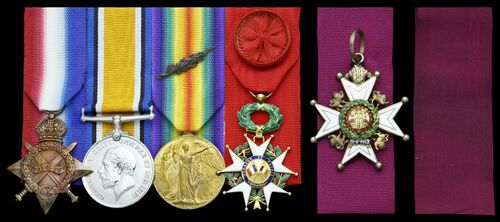
Auction: 24001 - Orders, Decorations and Medals
Lot: 116
The '1918 C.B.' group of five awarded to Admiral T. D. Gilbert, Royal Navy, who captained H.M.S. Yarmouth at the Battle of Jutland, becoming to be one of the last surviving Captains from that monumental engagement
Earning a 'mention' for his services, he was still skippering Yarmouth when Commander Rutland made his historic aeroplane take-off from her deck, the first time that feat was achieved
The Most Honourable Order of the Bath, Companion's (C.B.) neck Badge, Military Division, silver-gilt and enamel; 1914-15 Star (Capt. T. D. Gilbert, R.N.); British War and Victory Medals, with with M.I.D. oakleaves (Capt. T. D. Gilbert. R.N.); France, Republic, Legion of Honour, Officer's breast Badge, silver-gilt and enamel, slight enamel wear to first, overall good very fine (5)
C.B. London Gazette 1 January 1918.
Legion of Honour London Gazette 25 January 1918.
Thomas Drummond Gilbert was born on 1 November 1870 with the last name 'Pratt', he later changed it by Royal License to Gilbert. Entering the Royal Navy as a Naval Cadet at Brittania on 15 January 1884 before being appointed Midshipman in September 1886 and posted to H.M.S. Sultan.
Early Career
Advanced Sub-Lieutenant Lieutenant in September 1890 and Lieutenant in January 1893 he served in a variety of postings during this time. A notable one being as second in command of the cruiser Tauranga. His time with her coinciding with her stay in Sydney, Australia, where she was stationed in case fresh British intervention were needed in the ongoing Second Samoan Civil War.
Gilbert's first independent command occurred just after leaving Tauranga on 12 March 1902 with the Bramble-class gunboat H.M.S. Britomart. Further promoted Commander on 31 December 1904 he served aboard a number of vessels, not in command, before going ashore for a navigation course in 1908. Upon returning to sea in January 1911 Gilbert took the helm of Spartiate receiving glowing reports from all of his commanders, including Prince Louis of Battenberg. He was promoted Captain at the end of that year on 31 December. After this he was appointed to the 1912 Admiralty committee inquiring into matters of discipline and the system of summary punishments in the Navy.
The Great War
Returning to the Royal Naval War College in Portsmouth in 1913 he undertook numerous courses in Signalling and Navigation, ending with a new command, H.M.S. Galatea. Gilbert was still with this vessel on the outbreak of war in August 1914 but was soon posted away to the scout cruiser Active before joining Yarmouth in January 1915.
This cruiser was initially stationed with the 2nd Light Cruiser Squadron but soon joined the 3rd Light Cruiser Squadron in February. It was with this unit that she was to take part in the Battle of Jutland on 31 May-1 June 1916 as part of Beatty's Battlecruiser Fleet. During the action Yarmouth served as link ship between the rest of the Squadron and Lion. For his role in the action Gilbert received a 'mention' (under the name of 'Pratt' London Gazette 15 September 1916, refers).
Continuing to command Yarmouth after the war Gilbert was still with her the next year when Commander Rutland of the Royal Naval Air Service took off from a flying off platform atop her turret. This was the first time such a manoeuvre had been attempted. Gilbert was posted to command the Battleship Thunderer the next month in August 1917.
This vessel was assigned to the Grand Fleet in British waters and did not see action again during the war. Towards the end of the conflict Gilbert was appointed a Companion of the Order of the Bath and an Officer of the French Legion of Honour.
Post-War
Posted to Malta a Chief of Staff to the Senior Naval Officer in 1919 he served in this role for the next two years. Appointed A.D.C. to the King on 1 July 1921 Gilbert was advanced Rear Admiral on 7 April 1922. He raised his flag aboard Curacao in 1923 to command the 2nd Cruiser Squadron of the Atlantic Fleet, a post he held until 1925. Retiring two years later in 1927 he was appointed a Vice-Admiral and was later promoted Admiral on the retired list in 1931. His death on 24 January 1962 at Taynton House, Oxfordshire made him one of the last surviving captains from the Battle of Jutland; sold together with copied service papers, an obituary and extracts from the London Gazette, Whose Who and Companionage as well as The Fighting at Jutland, The Battle of Jutland Bank and The Smoke Screen of Jutland along with a photograph of H.M.S. Thunderer.
Subject to 20% VAT on Buyer’s Premium. For more information please view Terms and Conditions for Buyers.
Sold for
£2,000
Starting price
£1800




